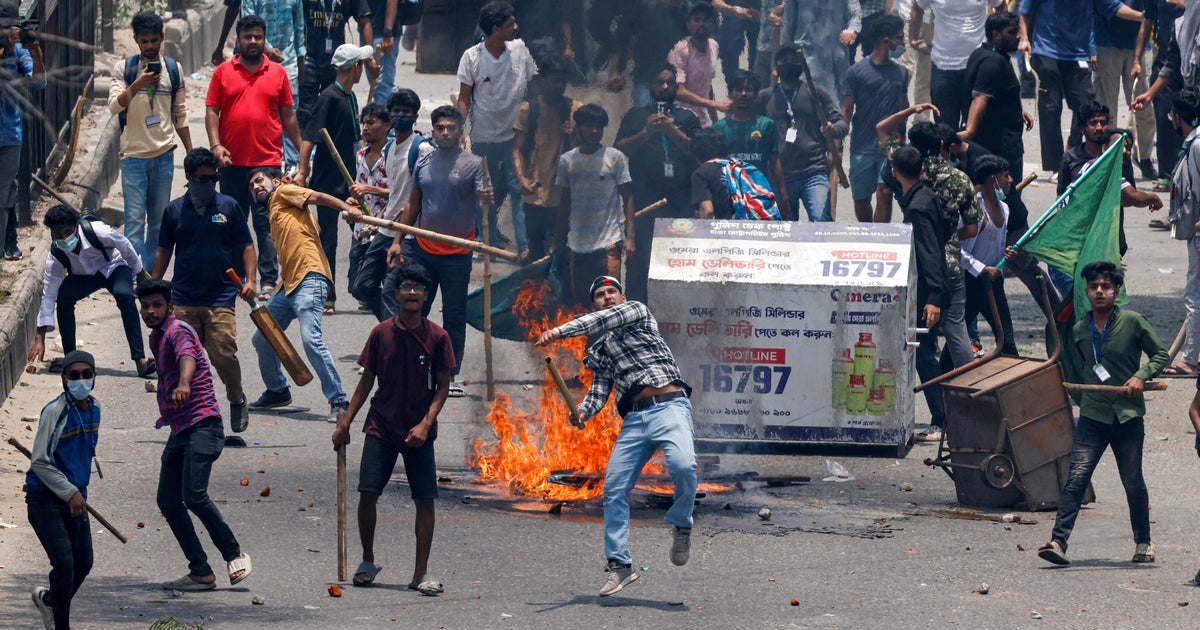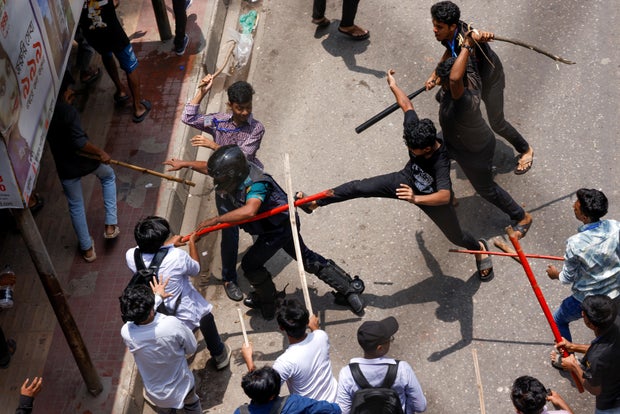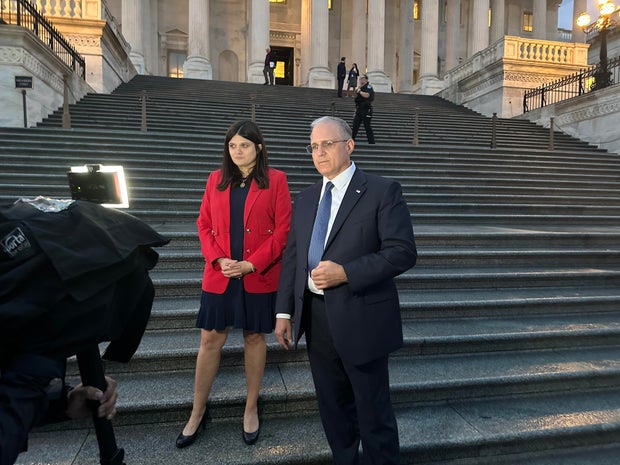CBS News
Bangladesh protesters furious over job allocation system clash with police, with at least 25 deaths reported

New Delhi — At least 28 people have been killed and hundreds injured in the latest wave of violent clashes between student protesters and police across Bangladesh, local media have reported. Authorities blocked phone and internet services across the country late this week in a bid to quash the unrest as police fire tear gas and rubber bullets at the demonstrators.
“Mobile internet has been temporarily suspended due to various rumors and the unstable situation created… on social media,” Zunaid Ahmed Palak, the country’s deputy information and technology minister told reporters.
Police have also banned all public gatherings and processions in the capital city of Dhaka, indefinitely.
What is happening now in Bangladesh?
The country’s Prothom Alo newspaper said at least 19 people were killed Thursday alone, the deadliest day of clashes yet. Another national newspaper, the Daily Star, reported the same death toll, which would bring the total number of fatalities this week to 25, according to the country’s media.
The Bangladeshi government and police have not released any casualty figures.
Mohammad Ponir Hossain/REUTERS
Thousands of protesters attacked the headquarters of the state broadcaster, Bangladesh Television (BTV), in Dhaka on Thursday, setting the building and parked cars on fire. A day earlier, Prime Minister Sheikh Hasina appeared on the network appealing for peace. BTV and other news networks went off the air on Friday.
Hasina’s government has reached out to protest leaders to engage in talks, and federal Law Minister Anisul Huq told reporters Thursday that the government had appointed him and Education Minister Mohibul Hassan Chowdhury to lead the conversations, but the protesters have rejected the offer of a dialogue.
“The government has killed so many people in a day that we cannot join any discussions in the current circumstances,” protest leader Nahid Iqbal told the regional Bengali service of CBS News’ partner network BBC.
“The Prime Minister is asking for an end to the violence with one hand whilst, with the other hand, attacking students using pro-ruling party groups and the police,” another protester, Aleem Khan, told the BBC.
What are the Bangladesh protests about?
Young people, many of them college students, started protesting in early July against a job reservations system they see as unfairly benefiting ruling politicians and their families. At first it was largely peaceful sit-ins, blocking roads and railways, but the clashes with police have ramped up since Tuesday.
The protests started at Dhaka University but spread quickly to other educational institutions in the capital and beyond, especially after pro-ruling party groups entered the Dhaka campus and attacked protesting students. Earlier in the week, the government ordered schools and universities to close indefinitely as police tried to quash the unrest.
The protesters are demanding changes to a system that reserves 30% of high-ranking government jobs for relatives of veterans of the country’s 1971 war for independence. They argue that the job reservation system is discriminatory and has been exploited to benefit people close to Prime Minister Hasina and other politicians of her Bangladesh Awami League.
Protesters are demanding job recruitment based on merit.
Mohammad Ponir Hossain/REUTERS
Hasina’s government had scrapped the job reservation system in 2018, but a High Court decision reinstated it last month. The government appealed against the verdict and the Supreme Court suspended the High Court order, pending a government appeal scheduled for Aug. 7.
The country-wide agitation is the biggest crisis Hasina, 76, has faced since her re-election for a fourth term this year. Anger against the job quotas has been fueled by high unemployment rates among young Bangladeshis, who make up nearly a fifth of the country’s population of about 170 million.
Biden administration condemns violence
U.S. State Department spokesperson Matthew Miller urged the Bangladeshi government to “uphold individuals’ rights to protest peacefully.”
“The freedom of expression and peaceful assembly are essential building blocks of any thriving democracy, and we condemn any violence against peaceful protesters,” Miller said Thursday.
The U.S. Embassy in Bangladesh urged American citizens in the country on Wednesday to “practice vigilance and reconsider their travel plans, especially to areas around public universities… avoid demonstrations and exercise caution in the vicinity of any large gatherings.”
Rights group Amnesty International accused Bangladesh’s police of using unlawful force against the protesters.
“Bangladeshi authorities must fully respect people’s right to freedom of peaceful assembly in line with its commitments under international law and its own Constitution and protect peaceful protesters from further harm,” Taqbir Huda, Amnesty International’s South Asia researcher, said in a statement.
CBS News
9/17: The Daily Report with John Dickerson

Watch CBS News
Be the first to know
Get browser notifications for breaking news, live events, and exclusive reporting.
CBS News
Paul Whelan, freed in prisoner swap with Russia, tells other American detainees: “We’re coming for you”

Washington — Nearly seven weeks after the Russians handed over Paul Whelan on a tarmac in Ankara, Turkey, the Marine veteran stood on the steps of the U.S. Capitol with a message for other Americans who are held abroad.
“We’re coming for you,” he told reporters Tuesday night after he met with lawmakers. “It might take time, but we’re coming.”
Whelan said he spoke with lawmakers about how the government can better support detainees after they’re released.
“We spoke about how the next person’s experience could be better,” he said. “What the government could do for the next person that’s held hostage and comes home — the care and support that other people might need, especially people that are in a worse situation. There are people coming back that lived in the dirt without shoes for three years, people that were locked up in hideous conditions for 20 years. They need support.”
CBS News
The U.S. secured Whelan’s release in August in one of the largest prisoner swaps since the end of the Cold War. The complex deal came after months of sensitive negotiations between the U.S., Russia, Germany, Slovenia, Poland and Norway.
As part of the deal, Russia released 16 prisoners while the Western countries released eight Russians. Whelan was released alongside Wall Street Journal reporter Evan Gershkovich, Russian-American radio journalist Alsu Kurmasheva and Vladimir Kara-Murza, a U.S. green card holder and Kremlin critic.
Whelan, who had been the longest-held American detainee in Russia, was arrested in December 2018 when he traveled to the country to attend a friend’s wedding. He was convicted of espionage in a secret trial and sentenced to 16 years in prison in 2020.
Whelan, his family and the U.S. government vehemently denied that he was a spy and accused Russia of using him as a political pawn. The U.S. government considered him to be wrongfully detained, a rare designation that put more government resources toward securing his release.
But a deal to secure his freedom was long elusive. He remained behind bars as Russia freed Marine veteran Trevor Reed and women’s basketball star Brittney Griner — both of whom were detained after Whelan’s arrest — in prisoner swaps with the U.S.
The U.S. said it pushed for his inclusion in both exchanges, but Russia refused. It led to Whelan advocating for his own release from a remote prison camp, calling government officials and journalists to make sure that he wasn’t forgotten.
When the plane carrying Whelan, Gershkovish and Kurmasheva landed in Maryland on Aug. 1, Whelan was the first to disembark. He was greeted by President Biden, who gave Whelan his American flag pin, and Vice President Kamala Harris.
“Whether he likes it or not, he changed the world,” Rep. Haley Stevens, a Michigan Democrat, told reporters Tuesday.
Whelan’s case and his family’s constant pressure on the U.S. government brought more attention to the cases of Americans who are wrongfully detained by foreign governments.
Haley said Whelan is a reminder to other Americans considering traveling to Russia that “you have a target on your back.”
Whelan said it’s been an adjustment acclimating to life back in the U.S., especially learning the latest technology like his iPhone 15.
“I was in a really remote part of Russia,” he said. “We really didn’t have much. The conditions were poor. The Russians said the poor conditions were part of the punishment. And coming back to see this sort of thing now is a bit of a shock, but it’s a good shock.”
CBS News
Pennsylvania struggling with low energy prices amid 2024 fracking focus

Watch CBS News
Be the first to know
Get browser notifications for breaking news, live events, and exclusive reporting.










